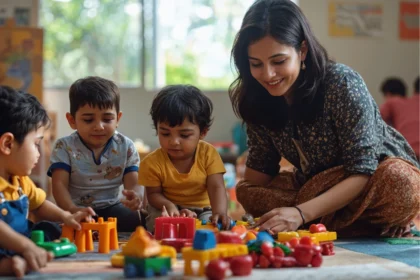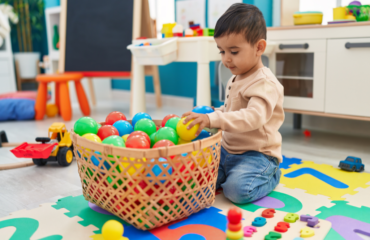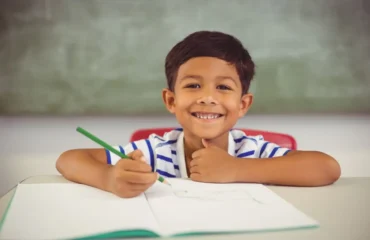
Many parents ask, “Which is the best pre primary schools near me?” Finding the perfect pre primary school for your child can be a big decision. After all, the world of pre primary education is where the magic begins, setting the foundation for your child’s learning journey. It needs to be chosen wisely. However, with so many options around us, choosing the best one is challenging. In this article, we discussed what a pre primary school is and some factors to consider before enrolling your child. So let’s get started!
What is a Pre Primary School?
A pre primary school is an early childhood education institution that helps children transition from home to formal schooling. Designed for kids typically between 3 and 6 years old, pre primary education focuses on developing essential cognitive, social, and emotional skills through structured play and interactive learning.
Unlike primary schools, which emphasize academics, pre primary schools focus on foundational learning through fun and engaging activities. The goal is to create a nurturing environment where children develop language skills, motor coordination, creativity, and social interaction.
Key Factors to Consider While Choosing a Pre Primary Schools Near Me
Here are some of the factors to consider before enrolling your child in pre primary schools near me:
Understanding the Curriculum and Teaching Approach
One of the most crucial factors to consider is the teaching methodology and curriculum of the pre primary school. Make sure the teaching methodology is best suited to your child’s unique personality combined and interests.
Some schools practice Montessori education to enable their students to explore independently through self-directed education and hands-on activities for learning. A second teaching approach bases its curriculum on play-based learning by integrating storytelling and art activities with games that easily let children learn. The Reggio Emilia philosophy guides certain institutions toward teaching students through creative activities while they collaborate and explore. Prospective parents need to determine the teaching approach followed by the school while assessing its balanced focus on holistic child growth and support for problem-solving abilities besides social aptitude and emotional competency development. Watching classroom activities during your visit to the school will enable you to see their educational procedures better.
The Role of Teachers and Student-Teacher Ratio
Young children need continuous personal supervision because an optimal student-teacher ratio is critical for their development. The educational outcome of each young child becomes better with a lower student teacher ratio. A large number of students create challenges for teachers who need to attend to specific educational requirements for each individual.
An evaluation process should be implemented for both the qualifications and years of experience of teaching professionals. Our prime criterion for selecting a pre primary school includes teachers who hold expertise in early childhood education and possess strong knowledge of child psychology. Teachers need to have patience as well as engagement skills along with the ability to nurture students so they create an encouraging space for children to express themselves. Educational institutions which dedicate funding to persistent training initiatives for educators succeed in implementing modern teaching practices while sustaining superior teaching excellence.
Infrastructure and Safety Measures
An environment that caters to children remains essential for pre primary education establishments. The education spaces must contain bright lighting along with adequate room size and elements that spark discovery as well as pupil involvement. Various children learning materials and play areas and diverse educational toys work together to foster successful early childhood learning.
Beyond aesthetics, safety is non-negotiable. Safe schools require adaptable access points, security cameras and qualified personnel who operate emergency procedures. The play areas must have safe soft surfaces while every facility must maintain its child-friendly safety standards. Maintaining proper hygiene standards includes fully sanitized public spaces throughout the school premises as well as health protocols for staff and students.
Also read: How Does Preschool Set the Foundation for Learning? – Role of Preschool in Child’s Development
Extracurricular Activities and Play-Based Learning
The education provided to young children before primary school focuses on their entire growth rather than traditional academic learning. The learning process for children at this age most effectively happens when they engage in play activities alongside exploration and creative expression. The educational institution needs to provide students with multiple extracurricular choices which encompass music, dance, storytelling, painting and team-based activities.
Physical activities play an equal role for motor skill growth and complete wellness development. Physical activities such as outdoor play areas and sports-based activities together with yoga sessions will help students develop coordination skills and lead to an active way of life. Through curriculum integration these school programs enable students to develop rational abilities together with team-building competencies and personal self-assurance.
Proximity, Accessibility, and Transportation
Your daily activities will significantly affect where your child attends school. You should opt for a nearby pre primary school since the shorter distance enables easier access and reduces daily commuting needs. Review the transport system of the school to make sure it maintains dependable security protocols which include GPS tracking features and trained driving staff alongside committed support personnel.
A school’s operating hours combined with its flexibility arrangement must be inspected because working parents need this information. After-school programs together with daycare services at pre primary schools benefit working parents with hectic schedules.
Parental Involvement and Communication
The practice of open communication between schools and parents yields constant valuable outcomes. Your child’s academic development stays clear through the combination of scheduled parent-teacher interactions together with workshops and feedback opportunities. Parent involvement at schools extends to events and storytelling sessions and creative activities which creates stronger ties between parents and teachers.
Check schools that offer evaluation reports along with newsletters through digital resources that enable parents to follow their child’s educational development. An open-door policy represents a well-organized institution because it allows parents to freely express their worries.
School Reputation, Reviews, and Word-of-Mouth Recommendations
Research about the reputation of schools should be your first step before final school selection. The school reputation can be assessed through reading online reviews along with testimonials and feedback from parents who have children there. Educational school decisions can benefit from first-hand recommendations that people receive from friends and neighbors and work associates.
You should verify whether the school holds membership in established educational boards or institutions. A pre primary education following established state or national guidelines tends to offer organized complete student learning programs to students.
FAQs:
Are pre primary schools mandatory for children?
pre primary education is not mandatory, but it is highly recommended as it lays the foundation for primary school learning and social adaptation.
How much does pre primary schools near me cost?
The cost varies based on location, curriculum, facilities, and reputation. Fees can range from ₹30,000 to ₹1,50,000 per year, depending on the school.
Do pre primary schools near me provide meals and transport?
Many schools offer snack programs and transportation services, but this varies. It’s best to check with the school about these facilities.





